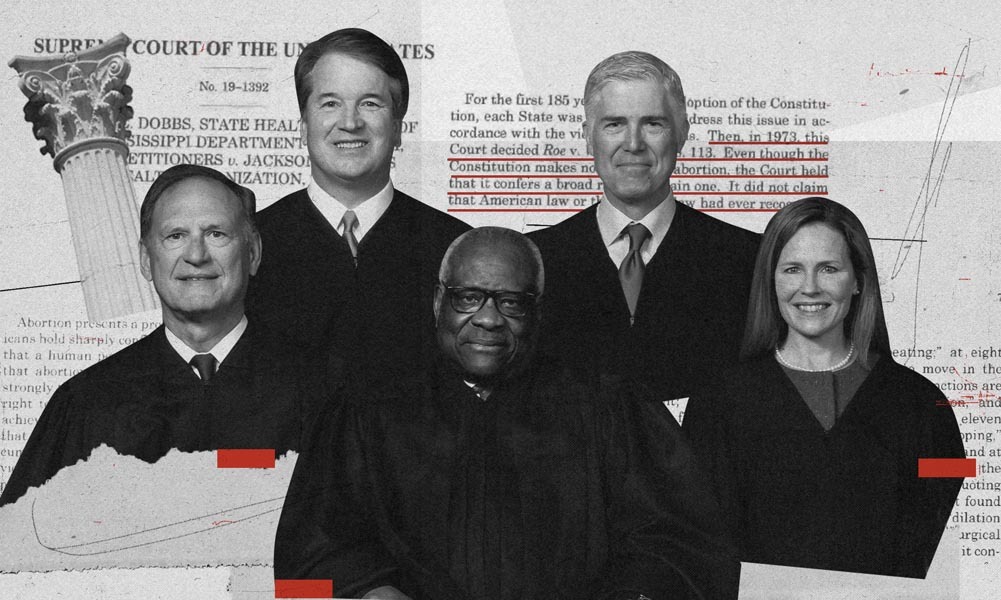 News Staff
News Staff![]() -
June 24, 2022 -
Health -
Supreme Court
Roe v Wade
overruled
-
55.9K views -
0 Comments -
0 Likes -
0 Reviews
-
June 24, 2022 -
Health -
Supreme Court
Roe v Wade
overruled
-
55.9K views -
0 Comments -
0 Likes -
0 Reviews

JTFMax:
After nearly 50 years, the Supreme Court has overturned the 1973 Roe v. Wade decision, which protected the right to an abortion—holding that there is no longer a federal constitutional right to an abortion. The decision will lead to all but total bans on abortion in approximately half the states.
June 24, 2022 - Five justices signed onto the majority opinion, striking down the landmark decision.
And three justices dissented:
9. Chief Justice John Roberts did not join the majority, writing in a concurring opinion that he would not have overturned Roe but instead would have only upheld Mississippi's law banning abortions after 15 weeks.
Here is a look at the history of the now-overturned case:
1971 - The case is filed by Norma McCorvey, known in court documents as Jane Roe, versus Henry Wade, the district attorney of Dallas County. He enforced a Texas law that restricted abortion, except to conserve a lady's life.
Decision.
January 22, 1973 - The United States Supreme Court, in a 7-2 decision, affirms the legality of a woman's right to have an abortion under the Fourteenth Change to the Constitution. The Court held that a female's right to an abortion fell within the right to privacy (acknowledged in Griswold v. Connecticut) secured by the Fourteenth Modification. The decision offered a female the right to an abortion during the entirety of the pregnancy. In addition, it defined various levels of state interest in managing abortion in the 2nd and third trimesters.
The ruling affected laws in 46 states.
1971 - The Supreme Court agrees to hear the case submitted by Roe against Wade. He was implementing the Texas abortion law stated unconstitutional in an earlier federal district court case. However, Wade disregarded the legal ruling, and both sides appealed.
December 13, 1971 - The case is argued before the US Supreme Court.
October 11, 1972 - The case is reargued before the United States Supreme Court.
January 22, 1973 - The US Supreme Court, in a 7-2 choice, affirms the legality of a lady's right to have an abortion under the Fourteenth Amendment to the Constitution.
June 17, 2003 - McCorvey (Roe) files a motion with the federal district court in Dallas to have the case overturned and asks the Court to consider brand-new proof that abortion harms women. It consists are 1,000 affidavits from females who state they regret their abortions.
September 14, 2004 - According to the Court's clerk, a three-judge panel of the fifth United States Circuit Court of Appeals in New Orleans dismissed McCorvey's motion to reverse the case.
May 2, 2022 - In a spectacular breach of Supreme Court privacy and secrecy, Politico has obtained what it calls a draft of a majority opinion written by Justice Samuel Alito that would overturn Roe v. Wade's holding of a federal constitutional right to an abortion. The opinion in the case is not anticipated to be published till late June. The Court validates the document's credibility on Might 3 but worries it is not the decision.
The Players.
McCorvey - Texas homeowner who looked to get an abortion. Texas law forbade abortions except to conserve the pregnant mom's life. McCorvey was pregnant when she was the lead plaintiff in the event. She gave up the infant for adoption.
McCorvey has since come forward and spoken against abortion. In 1997, McCorvey started Roe No More, an anti-abortion outreach organization that was liquified in 2008. McCorvey died on February 18, 2017. In the 2020 documentary "AKA Jane Roe," before she died in 2017, McCorvey informed the movie's director that she had not changed her mind about abortion however became an anti-abortion activist because she was being paid.
Henry Wade - District attorney of Dallas County from 1951 to 1987. McCorvey sued him because he implemented a law restricting abortion other than saving a woman's life. He passed away on March 1, 2001.
Sarah Weddington - Attorney for McCorvey.
Linda Coffee - Lawyer for McCorvey.
Jay Floyd - Argued the case for Texas the very first time.
Robert C. Flowers - Reargued the case for Texas.
Supreme Court Justice Viewpoints.
Harry A. Blackmun (for The Court), William J. Brennan, Lewis F. Powell Jr., Thurgood Marshall.
Concurring: Warren Burger, William Orville Douglas, Potter Stewart.
Dissenting: William H. Rehnquist, Byron White.

Desert Local News is an invitation-only, members-based publication built on fact-checked, non-biased journalism.
All articles are publicly visible and free to read, but participation is reserved for members—comments and discussion require an invitation to join.
We cover local, state, and world news with clarity and context, free from political agendas, outrage, or misinformation.